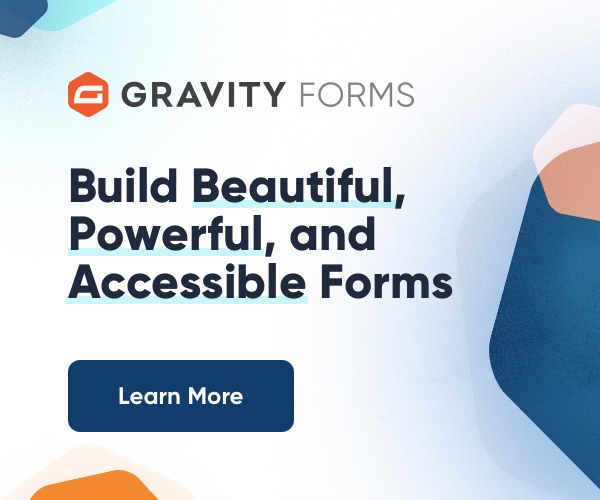- Introduction
- The Evolution of Form Builders
- Understanding Gravity Forms
- Superior Features of Gravity Forms
- Seamless Integration and Compatibility
- User Experience and Support
- Real-Life Success Stories
- Gravity Forms vs. Competitors
- Tips for Maximizing Gravity Forms
- Conclusion
We have hands-on, real world experience with everything we recommend. When you buy through our links, we may earn a commission.
I. Introduction
In the ever-evolving landscape of website design and user engagement, the role of form builders cannot be overstated. Among the myriad of options available, Gravity Forms has emerged as a standout choice for WordPress users seeking unparalleled functionality and versatility. As websites strive to capture leads, gather feedback, and facilitate transactions seamlessly, the choice of form builder becomes paramount. In this comprehensive guide, we delve into why Gravity Forms reigns supreme as the ultimate solution for WordPress users, offering unparalleled features, seamless integration, and user-friendly design.
Gravity Forms represents a culmination of years of evolution in the form building arena. From the early days of basic contact forms to the advanced solutions available today, Gravity Forms has continually pushed the boundaries of what's possible. Its intuitive drag-and-drop interface, extensive customization options, and seamless integration with third-party services have made it the go-to choice for users of all skill levels. As the demands of website owners have grown more complex, Gravity Forms has risen to the occasion, providing a robust solution that meets the diverse needs of modern websites.

As we navigate through the intricacies of Gravity Forms, it's essential to understand its significance in the broader context of WordPress development. With its ability to streamline form creation, enhance user experience, and drive conversion rates, Gravity Forms has become an indispensable tool for website owners and developers alike. In the following sections, we'll explore the key features, benefits, and real-life applications of Gravity Forms, shedding light on why it has earned its reputation as the best form builder for WordPress. Whether you're a seasoned developer or a business owner looking to optimize your website, this guide will equip you with the knowledge and insights needed to harness the full potential of Gravity Forms.
II. The Evolution of Form Builders
In the early days of WordPress, form builders were basic plugins primarily used for simple contact forms. These plugins lacked advanced features and customization options, limiting their functionality for users with more complex form-building needs. However, as the demand for more sophisticated form solutions grew, developers began creating advanced form builder plugins with a wider range of features and capabilities. This marked the rise of form builders like Gravity Forms, which revolutionized the way forms were created and managed on WordPress websites.
Gravity Forms emerged as a game-changer in the world of WordPress form builders, offering a comprehensive solution with a plethora of advanced features and customization options. Unlike its predecessors, Gravity Forms provided users with an intuitive drag-and-drop interface, making it easy to create and customize forms without any coding knowledge. Additionally, Gravity Forms introduced advanced field types, conditional logic, and seamless integration with other WordPress plugins, setting a new standard for form builder plugins on the platform. As a result, Gravity Forms quickly became the go-to choice for users seeking the best form builder for WordPress.
III. Understanding Gravity Forms
Gravity Forms is a powerful form builder plugin for WordPress that offers a wide range of features and capabilities to meet the diverse needs of website owners. With Gravity Forms, users can create highly customizable forms for various purposes, including contact forms, surveys, quizzes, and more. The plugin boasts an intuitive drag-and-drop interface, allowing users to easily design and customize their forms to match their website's branding and requirements. Additionally, Gravity Forms offers advanced features such as conditional logic, multi-page forms, and integration with popular third-party services, making it the best form maker for WordPress.
When it comes to pricing and plans, Gravity Forms offers flexible options to accommodate users of all levels and budgets. The plugin provides several pricing tiers, ranging from basic to advanced levels, with features such as form entries, add-ons, and support varying depending on the plan. Whether you're a small business owner looking to create a simple contact form or a developer working on a complex web project, Gravity Forms has a plan that's suitable for your needs. With its robust features, user-friendly interface, and flexible pricing options, Gravity Forms has solidified its position as the best form builder for WordPress.
IV. Superior Features of Gravity Forms
Gravity Forms stands out as the best form builder for WordPress due to its array of superior features that enhance form-building capabilities. One of its standout features is its intuitive drag-and-drop interface, which allows users to effortlessly create and customize forms without any coding knowledge. This user-friendly approach makes Gravity Forms accessible to users of all skill levels, from beginners to experienced developers.
Moreover, Gravity Forms offers a diverse range of field types and customization options, enabling users to create highly tailored forms that cater to specific needs and requirements. Whether you need a simple contact form or a complex multi-page form with conditional logic, Gravity Forms has you covered.
Another key advantage of Gravity Forms is its seamless integration with other WordPress plugins and third-party services. This integration capability allows users to extend the functionality of their forms by connecting them with email marketing platforms, CRM systems, payment gateways, and more.
Whether you're collecting leads, processing payments, or automating workflows, Gravity Forms provides the flexibility to integrate with the tools and services you rely on. Additionally, Gravity Forms offers robust security features to protect user data and prevent spam submissions, ensuring that your forms are secure and reliable.
V. Seamless Integration and Compatibility
Gravity Forms excels in seamlessly integrating with other WordPress plugins and third-party tools, enhancing its versatility and compatibility. One of its notable integrations is with popular email marketing platforms such as ActiveCampaign, Constant Contact, and MailChimp.
By connecting Gravity Forms with your email marketing service, you can automatically add form submissions to your mailing list, segment contacts based on form responses, and nurture leads through targeted email campaigns. This integration streamlines your marketing efforts and helps you maximize the value of your form submissions.
Furthermore, Gravity Forms integrates seamlessly with various CRM systems, including ActiveCampaign, HubSpot, and Salesforce. This integration allows you to sync form submissions with your CRM database, create new leads or contacts automatically, and track interactions throughout the customer journey.
By centralizing your lead data and streamlining data management processes, Gravity Forms empowers you to build stronger relationships with your customers and drive business growth.
Additionally, Gravity Forms integrates with payment gateways such as PayPal, Stripe, and Authorize.Net, enabling you to accept payments directly through your forms. Whether you're selling products, services, or event tickets, Gravity Forms provides a secure and convenient way to collect payments and process transactions seamlessly.
VI. User Experience and Support
Gravity Forms places a strong emphasis on user experience, evident in its intuitive interface and comprehensive support options. Its user-friendly design facilitates effortless form creation, customization, and management, catering to users of all skill levels. Through its drag-and-drop builder and extensive customization features, users can swiftly design forms that align with their branding and fulfill their specific needs.
Furthermore, Gravity Forms provides a wealth of resources including comprehensive documentation, tutorials, and video guides, aiding users in getting started and resolving any encountered issues. Additionally, the plugin boasts a dedicated support team ready to assist users with questions or technical difficulties, ensuring a seamless and hassle-free experience.
In the realm of user experience, Gravity Forms stands out for its intuitive interface and robust support infrastructure. The plugin's design philosophy revolves around simplifying form creation and management, allowing users to effortlessly navigate through the process without requiring extensive technical knowledge. Its drag-and-drop builder and wide array of customization options empower users to tailor forms to their exact specifications, ensuring consistency with their website's branding.
Furthermore, Gravity Forms provides an extensive library of documentation, tutorials, and video guides, serving as valuable resources for users seeking guidance or troubleshooting assistance. With a dedicated support team on standby, users can rest assured that any queries or technical issues will be promptly addressed, contributing to a positive and seamless user experience.
Gravity Forms, the best form maker for WordPress, excels in delivering an optimal user experience through its intuitive design and comprehensive support system. By prioritizing usability and accessibility, the plugin enables users to create, customize, and manage forms with ease, regardless of their technical proficiency. Its drag-and-drop interface and extensive customization capabilities empower users to design forms that reflect their unique brand identity and meet their specific requirements.
Additionally, Gravity Forms offers a wealth of educational resources and dedicated support services, ensuring that users have the necessary tools and assistance to maximize their experience and achieve their form-building goals.
VII. Real-Life Success Stories
Gravity Forms has a proven track record of success, with numerous real-life examples showcasing its effectiveness in various industries and use cases. For instance, an e-commerce website saw a significant increase in conversion rates after implementing Gravity Forms for its checkout and contact forms. By optimizing the user experience and streamlining the checkout process, the website was able to reduce cart abandonment rates and drive more sales.
Similarly, a service-based business used Gravity Forms to automate lead generation and client intake processes, resulting in improved efficiency and scalability. These success stories demonstrate the tangible impact that Gravity Forms can have on businesses of all sizes and industries.
VIII. Gravity Forms vs. Competitors
In the realm of form builders for WordPress, Gravity Forms emerges as the frontrunner when compared to its competitors, WPForms and Ninja Forms. Gravity Forms boasts an extensive array of features and customization options, surpassing its counterparts with advanced field types, robust conditional logic, and seamless integration with third-party services.
Moreover, Gravity Forms stands out for its superior support and documentation, offering users comprehensive resources to navigate the platform effortlessly and address any challenges that may arise. While WPForms and Ninja Forms have garnered recognition as viable alternatives, Gravity Forms maintains its position as the preferred choice for users seeking unparalleled versatility and functionality in form-building solutions for WordPress.
Gravity Forms outshines its competitors, WPForms and Ninja Forms, by offering an unparalleled range of features and customization capabilities. With advanced field types and comprehensive conditional logic, Gravity Forms empowers users to create highly tailored and dynamic forms to meet their unique needs. Furthermore, Gravity Forms seamlessly integrates with a multitude of third-party services, enhancing its functionality and versatility.
Additionally, Gravity Forms sets itself apart with its robust support infrastructure and extensive documentation, ensuring users receive prompt assistance and guidance whenever needed. While WPForms and Ninja Forms may offer similar functionalities, Gravity Forms' comprehensive feature set and superior support make it the top choice for WordPress users.
In the competitive landscape of WordPress form builders, Gravity Forms maintains its supremacy over rivals WPForms and Ninja Forms due to its unmatched combination of features, customization options, and support services. Gravity Forms offers users a comprehensive toolkit for creating dynamic and highly functional forms, with advanced capabilities such as conditional logic and seamless integration with third-party services.
Moreover, Gravity Forms prioritizes user satisfaction with its robust support infrastructure and extensive documentation, providing users with the resources they need to succeed. While WPForms and Ninja Forms may appeal to certain users, Gravity Forms remains the premier choice for those seeking the most comprehensive and flexible form-building solution for WordPress.
IX. Tips for Maximizing Your WordPress Form Plugin
To make the most of Gravity Forms or any WordPress form plugin, consider these tips for optimizing your forms:
- Streamline your forms: Keep your forms concise and focused by only including essential fields. Long forms can deter users from completing them, so prioritize the information you truly need.
- Utilize conditional logic: Take advantage of conditional logic to show or hide fields based on user responses. This keeps your forms dynamic and relevant, guiding users through a personalized experience.
- Design for mobile: With a growing number of users accessing websites from mobile devices, ensure your forms are mobile-friendly. Test your forms on different devices to ensure they display and function properly on all screen sizes.
- Enable spam protection: Protect your forms from spam submissions by enabling built-in spam protection features or integrating with third-party anti-spam solutions. This helps maintain data accuracy and ensures legitimate submissions are prioritized.
- Regularly test and optimize: Continuously monitor the performance of your forms using analytics and user feedback. Conduct A/B tests to compare different form variations and identify opportunities for improvement.
X. Conclusion
In conclusion, Gravity Forms stands out as the best form builder for WordPress due to its robust features, seamless integration capabilities, and user-friendly interface. With its intuitive drag-and-drop builder, extensive customization options, and superior support, Gravity Forms empowers users to create highly functional and engaging forms that drive results. Whether you're collecting leads, processing payments, or conducting surveys, Gravity Forms provides the flexibility and reliability you need to succeed.
By following best practices and leveraging real-life examples of successful implementation, you can maximize the effectiveness of Gravity Forms and unlock its full potential for your WordPress website.
Frequently Asked Questions
- Why should I choose Gravity Forms over other form builders for my WordPress site?
Gravity Forms offers unparalleled versatility, robust features, and seamless integration capabilities that set it apart from other form builders. Its intuitive drag-and-drop interface, extensive customization options, and superior support make it the ideal choice for users of all skill levels.
- Can Gravity Forms handle complex form requirements?
Yes, Gravity Forms excels at handling complex form requirements. With features like conditional logic, multi-page forms, and advanced field types, it can accommodate a wide range of form scenarios, from simple contact forms to complex surveys and quizzes.
- How does Gravity Forms integrate with other WordPress plugins and third-party services?
Gravity Forms seamlessly integrates with a variety of WordPress plugins and third-party services, including email marketing platforms, CRM systems, and payment gateways. This integration capability allows users to extend the functionality of their forms and automate workflows.
- Is Gravity Forms suitable for mobile devices?
Yes, Gravity Forms is designed to be mobile-friendly, ensuring that forms display and function properly on all screen sizes. This allows users to access and complete forms from smartphones and tablets with ease.
- Can Gravity Forms help improve conversion rates on my website?
Yes, Gravity Forms can help improve conversion rates by providing a smooth and user-friendly form submission process. With features like conditional logic, user segmentation, and personalized experiences, Gravity Forms can guide users through the conversion funnel more effectively.
- What support options are available for Gravity Forms users?
Gravity Forms offers comprehensive documentation, tutorials, and video guides to help users get started and troubleshoot any issues they encounter. Additionally, the plugin's dedicated support team is available to assist users with any questions or technical challenges they may have.
- Are there any real-life examples of successful implementation of Gravity Forms?
Yes, there are numerous real-life examples of successful implementation of Gravity Forms across various industries and use cases. From e-commerce websites boosting conversion rates to service-based businesses streamlining lead generation processes, Gravity Forms has proven to be a valuable asset for businesses of all sizes.
- How does Gravity Forms compare to other popular form builders for WordPress?
When comparing Gravity Forms to other form builders like WPForms and Ninja Forms, Gravity Forms stands out for its extensive feature set, seamless integration capabilities, and user-friendly design. While other form builders may offer similar functionality, Gravity Forms excels in versatility and customization options.
- Can Gravity Forms help protect my forms from spam submissions?
Yes, Gravity Forms includes built-in spam protection features to help protect forms from spam submissions. Additionally, users can integrate Gravity Forms with third-party anti-spam solutions for added security.
- What are some best practices for optimizing Gravity Forms on my WordPress site?
Some best practices for optimizing Gravity Forms include keeping forms concise and focused, utilizing conditional logic to personalize the user experience, and regularly testing and optimizing forms for usability and performance. Additionally, integrating Gravity Forms with other plugins and services can further enhance its functionality and effectiveness.

Upgrade Your Website Forms
Install Gravity Forms on your website today to unleash the power of the best WordPress form plugin!

